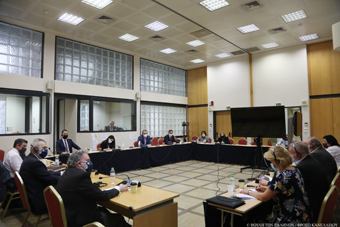Press Office
Athens, 12 May 2021
Meeting of ad hoc Committee of Parliamentary Assembly of Council of Europe on situation of migrants in Greece with cross-party delegation

A meeting was held at the Hellenic Parliament between a cross-party delegation from the Standing Committee on Public Administration, Public Order and Justice of the Hellenic Parliament and the ad hoc Sub-Committee for a fact-finding visit to Greece, of the Committee on Migration, refugees and Displace Persons of the Parliamentary Assembly of the Council of Europe (PACE). The meeting was chaired by the Swiss MP Pierre-Alain Fridez (SOC – Chairman of the above Committee) and attended by the Austrian MP Eduard Köck (EPP). The members of the cross-party delegation were: Maximos Charakopoulos (Chair of the Committee, New Democracy), Tasos Chatzivasileiou (New Democracy), Georgios Katrougalos (SYRIZA), Sokratis Famellos (SYRIZA), Georgios Kaminis (Movement for Change), Liana Kanelli (Communist Party of Greece), Konstantinos Chitas (Greek Solution) and Foteini Bakadima (DiEM25).
In his intervention, Mr. Charakopoulos referred to the need to update the EU-Turkey statement and stressed that “without practical European solidarity no country is able to fully address migrant and refugee flows of the size we observed in the years before the pandemic. Especially Greece which does not have a neighbour with which it can cooperate with sincerity and trust, but Mr. Erdogan’s Turkey, which instrumentalises the migration issue for its own political goals. And everyone in Europe saw this in the spring of 2020 in the Evros region, where state institutions, such as the Turkish gendarmerie, aided thousands of migrants in crossing into Greek territory”. He underlined that the same has been happening in the last 24 hours with boatloads of migrants from Libya who are being pushed towards Lampedusa in Italy. This is because Turkey was annoyed by the demand for the withdrawal of the army and the mercenary jihadists that it has transferred to Libya. Unfortunately, we also see this happening in the Aegean, where it has been proven that the Turkish coast guard accompanies boats with migrants into Greek territorial waters and does not hesitate to be aggressive, both against the Greek port authority and against the FRONTEX vessels. It is also well-known that Turkey not only does nothing to stop migrant flows cross its territory, but also provides incentives to transit, especially from the African continent, with cheap tickets and visa-free travel, in order to direct them towards the coastline and then towards the Greek islands. All these years, Greece, its small size and the difficult economic situation notwithstanding, tried to adequately fulfil its obligations to the waves of refugees. Unfortunately, the same does not hold true for many EU member states that do not even accept unaccompanied minors on their territory, effectively invalidating European solidarity.
The Ηead of the Greek delegation stressed that the new European migrant/refugee policy will need to incorporate certain basic prerequisites, such as:
a. The control of those wishing to enter Europe must be carried out outside the EU
b. The proportional relocation of those seeking international protection to other member states must be mandatory
c. The returns mechanism must be uniform for the whole of the EU, and, depending on their behaviour, sanctions or financial aid must be provided for the countries of origin.
d. The imposing of direct sanctions on countries that have been proven to instrumentalise the migrant issue
Summing up his intervention, Mr. Fridez congratulated Greece on the effective management of the issue of unaccompanied children. He referred to the need for immediate assistance to the countries sending migrants and spoke out against push-backs, as they are a violation of human rights.
Mr. Köck, after pointing out the much improved conditions at the hosting facilities, referred to the need to strengthen solidarity between European states, in order to allocate refugees equally. Furthermore, he stressed the human trafficking issue, underlining the urgent need to resolve it.
In his intervention, Mr. Katrougalos said that Greece respects international law and wants open societies. Regarding the asylum process, he argued that there is cross-party cooperation to resolve any delays in the granting process. Regarding the push-backs of migrants, he stressed that Greece respects human rights, however, if such complaints have been made they should be investigated.
Mr. Kaminis referred to the disproportionate burdens that Greece is carrying in comparison to other states and stressed the need to revise the Dublin Treaty.
Mrs. Kanelli called the EU-Turkey Statement an outrage, since it turns hot-spots into permanent structures. She referred to the Council of Europe and stressed that its role is to emphasise a Europe of peoples.
Mr. Chitas referred to the need to curtail uncontrolled actions by NGOs and noted that push-backs of migrants are allowed in cases of protection of public safety and public health.
Mrs. Bakadima called the migrant issue a humanitarian crisis, the resolution of which requires the solidarity and effective cooperation of all parties. She also stressed the need to increase common efforts to eliminate the phenomenon of instrumentalisation of migrants.
When he took the floor for the second time, Mr. Charakopoulos expressed his satisfaction with the “positive disappointment” of the members of the fact-finding mission, since the situation on the islands is much better than in the past. Regarding the “alleged returns by the port authority and FRONTEX”, as he said, nothing was proven by the European Commission controls, as it is Turkish propaganda and hearsay by shady NGOs. He also noted the progress made in granting asylum since the relevant legislation was changed. Finally, he decried Ankara’s unwillingness to implement the EU-Turkey Statement and emphasised the arbitrary interpretation by the Turkish authorities, which refuse to accept any migrants who have moved inland to decongest the islands.
High resolution images
Back